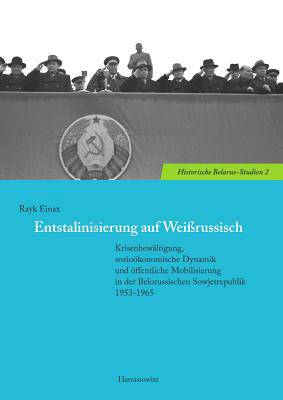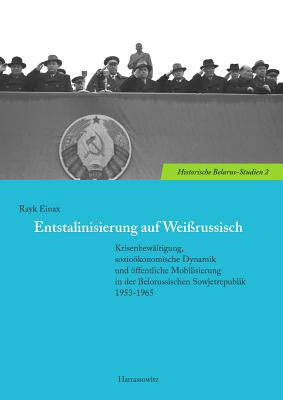
- Retrait en 2 heures
- Assortiment impressionnant
- Paiement sécurisé
- Toujours un magasin près de chez vous
- Retrait gratuit dans votre magasin Club
- 7.000.0000 titres dans notre catalogue
- Payer en toute sécurité
- Toujours un magasin près de chez vous
Entstalinisierung Auf Weissrussisch
Krisenbewaltigung, Soziookonomische Dynamik Und Offentliche Mobilisierung in Der Belorussischen Sowjetrepublik 1953-1965
Rayk Einax
Livre broché | Allemand
122,45 €
+ 244 points
Description
English summary: The Republic of Belarus, which lay halfway between Berlin and Moscow, has been shaped, above all, through creative stagnation and this book, by the Giessen based historian of Eastern Europe Rayk Einax, that the past of the former Soviet Republic is rather more interesting that is might first appear. Beginning in 1953, the year of Stalins death, Einax shows how the personal quarrels among the Belorussian party-members were quickly resolved, which was able to create the foundations for stunning socio-economic changes in the 1950s and 1960s. At the same time, the public conflict about the legacy of Stalinism persisted in the course of the 20th and 22nd Party Congresses. For the daily life of individual members of the population, social and political problems proved themselves dissimilar from those of political oppression and therefore the resulting substantial discontent was particularly influential in the elections of the Soviet Parliaments ("Councils") and the slogans about a rapid entrance of Soviet society into communism could offer no solutions for this discontent. At the same time, these struggles shaped the propagandistic basis for a sharp fight against the Soviet religious communities, although the religious, rural Belarussian population resisted massive hostilities in a noteworthy way. This study offers a panorama of the core problems in the development of a Soviet state in the post-war period and marked a critical state on the way to the modern republic at the edges of the European Union's Europe. German description: Die Republik Weissrussland, auf halbem Wege von Berlin nach Moskau gelegen, beeindruckt vor allem durch kreative Stagnation. Dass die Vergangenheit der einstigen Sowjetrepublik jedoch erheblich faszinierender ist, als es zunachst scheinen mag, zeigt das Buch des Giessener Osteuropahistorikers Rayk Einax. Ausgehend von Stalins Todesjahr 1953 wird aufgezeigt, wie personelle Querelen unter den weissrussischen Parteigenossen relativ rasch zur Ruhe kamen, wodurch die Grundlagen fur einen atemberaubenden soziookonomischen Wandel in den 1950er- und 1960er-Jahren gelegt werden konnten. Gleichzeitig ging die offentliche Auseinandersetzung um das stalinistische Erbe im Zuge des 20. und 22. Parteitags (1956/61) weiter. Fur den individuellen Alltag der Normalbevolkerung erwiesen sich die mannigfaltigen materiellen und sozialen Probleme als ungleich bedruckender, und der damit einhergehende massive Unmut verschaffte sich insbesondere zu den Wahlen der sowjetischen Parlamente ("Rate") Luft. Dem konnte auch die Parole vom baldigen Eintritt der Sowjetgesellschaft in den Kommunismus keine Abhilfe schaffen. Gleichwohl bildeten diese Blutentraume das propagandistische Fundament fur einen rigiden Kampf gegen die sowjetischen Glaubensgemeinschaften, wenngleich es den Glaubigen auf dem belarussischen Dorf gelang, den massiven Anfeindungen auf bemerkenswerte Art zu trotzen. Die vorliegende Studie bietet somit ein Panorama auf die Kernprobleme bei der Entwicklung sowjetischer Staatlichkeit in der Nachkriegszeit und markiert eine einschneidende Etappe auf dem Weg zur heutigen Republik am Rande (EU-)Europas.
Spécifications
Parties prenantes
- Auteur(s) :
- Editeur:
Contenu
- Nombre de pages :
- 443
- Langue:
- Allemand
Caractéristiques
- EAN:
- 9783447102759
- Date de parution :
- 01-09-14
- Format:
- Livre broché
- Format numérique:
- Trade paperback (VS)
- Dimensions :
- 170 mm x 239 mm
- Poids :
- 851 g

Seulement chez Librairie Club
+ 244 points sur votre carte client de Librairie Club
Les avis
Nous publions uniquement les avis qui respectent les conditions requises. Consultez nos conditions pour les avis.





